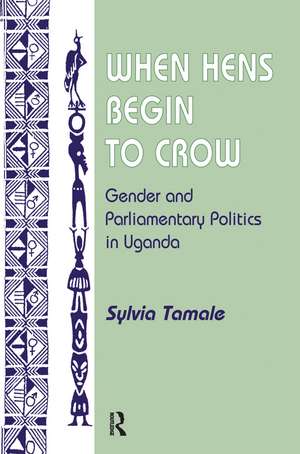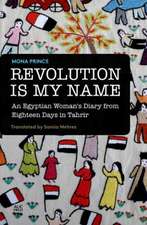When Hens Begin To Crow: Gender And Parliamentary Politics In Uganda
Autor Sylvia Tamaleen Limba Engleză Hardback – 30 apr 2019
| Toate formatele și edițiile | Preț | Express |
|---|---|---|
| Paperback (1) | 416.22 lei 6-8 săpt. | |
| Taylor & Francis – 13 dec 2000 | 416.22 lei 6-8 săpt. | |
| Hardback (1) | 1000.27 lei 6-8 săpt. | |
| Taylor & Francis – 30 apr 2019 | 1000.27 lei 6-8 săpt. |
Preț: 1000.27 lei
Preț vechi: 1219.84 lei
-18% Nou
Puncte Express: 1500
Preț estimativ în valută:
191.44€ • 199.33$ • 161.78£
191.44€ • 199.33$ • 161.78£
Carte tipărită la comandă
Livrare economică 08-22 martie
Preluare comenzi: 021 569.72.76
Specificații
ISBN-13: 9780367313968
ISBN-10: 0367313960
Pagini: 268
Dimensiuni: 152 x 229 x 16 mm
Greutate: 0.45 kg
Ediția:1
Editura: Taylor & Francis
Colecția Routledge
Locul publicării:Oxford, United Kingdom
ISBN-10: 0367313960
Pagini: 268
Dimensiuni: 152 x 229 x 16 mm
Greutate: 0.45 kg
Ediția:1
Editura: Taylor & Francis
Colecția Routledge
Locul publicării:Oxford, United Kingdom
Cuprins
* Introduction * Profiles of Five Political Women * Gender and the Politics of Parliamentary Representation * Women in the Parliamentary Electoral Process * The Gender Dynamics of Intraparliamentary Politics * Womens Legislative Activities Inside Parliament: Trends and Directions * Into the Trenches: Women Legislators and Their Constituents * Media-ted Portrayals of Women Politicians * Conclusion
Notă biografică
Sylvia Tamale is senior lecturer in the Department of Law and Jurisprudence at Makerere University in Kampala, Uganda.
Descriere
Among African countries, Uganda is unique in its affirmative action program for women. In the late 1980s, President Yoweri Museveni announced his belief that Uganda's successful development depended on increased gender equity and backed his opinions by setting several women-centered policies in motion, including a 1989 rule that at least 39 seats in the Ugandan parliament be reserved for women.In this fascinating study, based on in-depth interviews with both male and female parliamentarians, women in nongovernmental organizations, and rural residents of Uganda, Sylvia Tamale explores how women's participation in Ugandan politics has unfolded and what the impact has been for gender equity. The book examines how women have adapted their legislative strategies for empowerment in light of Uganda's patriarchal history and social structure. The author also looks at the consequences and implications of women's parliamentary participation as a result of affirmative action handed down by the president, rather than pushed up from a grassroots movement.Although focusing on Uganda, Tamale's study is relevant to other African and non-African countries grappling with the twin challenges of democracy and development.











